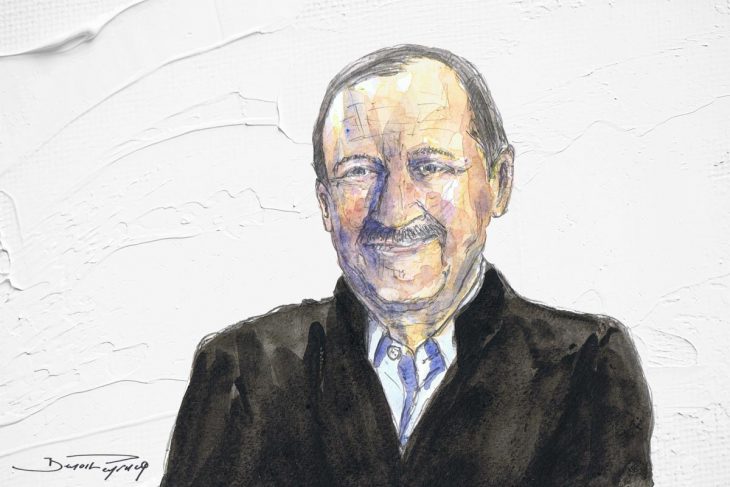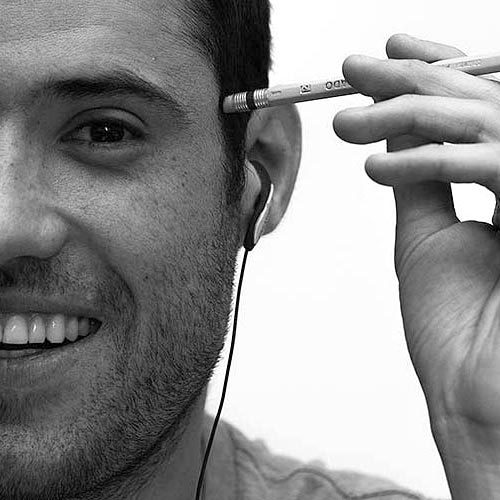JUSTICE INFO IN-DEPTH INTERVIEWS
Eduardo Cifuentes
President of Colombia's Special Jurisdiction for Peace (JEP)
Eduardo Cifuentes is the president of the Special Jurisdiction for Peace, the judicial arm of the transitional justice system stemming from the 2016 peace agreement between the Colombian government and the Revolutionary Armed Forces of Colombia (FARC). A former Constitutional Court justice, Cifuentes has become the visible face of the special tribunal - locally known as the JEP - which this year unveiled its first indictments against 8 former FARC commanders over kidnapping and 25 Army officials over extrajudicial executions.
JUSTICE INFO : You were a justice in Colombia’s first Constitutional Court - which was born with the 1991 Constitution - and then Ombudsman. In both positions you worked closely with victims of the internal armed conflict. Did you experience it personally?
EDUARDO CIFUENTES : I believe that all Colombians my age have lived through the conflict since childhood. I was born in 1954, so I remember it at home in Popayán [in Cauca department, south of Colombia], in the family, in public transport, in the press, in the lives of uncles, and then in urban contexts from the 1970s onwards. The 1991 Constitution also emerged in a context of diffuse violence in the country and then I was Ombudsman during one of the most critical moments of national history.
After traversing that period, as president and magistrate of the Special Jurisdiction for Peace, we’re also living amid a violence that recycles itself and refuses to die out, and a faltering State that isn’t able to fulfil its own functions comprehensively. It seems as if the signs of violence were parallel to our existential journey.
I feel that I was born in a territory of minimums, but in the 21st century we have to open more horizons for this society and these generations. The JEP is part of a response to those minimums.
In the Constitutional Court, when discussing the case of Luis Humberto Rolón, who was threatened, attacked and forced into exile for his political ideas, you stated that a “modicum of peace” is required to materialize the Constitution’s promise of achieving a peaceful country. Thirty years later, do you see the JEP strengthening that “modicum of peace”?
A Constitution is an agreement on minimums, on limits and on the utopian outline of a society. The possibility of governance is based on civil and political modicums, from which an institutional thickness and common ground can emerge. And, in our case, also from a modicum of peace so that society is not brutalized.
A community’s history is one of how those minimums can progress and densify, but also - as nothing is written and political life is subject to random and contingent elements - it is possible that they have a difficult life and struggle to immunize a society from the risk of those modicums not growing any more. Colombia has always had many minimums: we have, for the purposes of a democracy, an electoral minimum; for the purposes of a welfare state, a minimum possibility of distribution and creation of public goods; for the purposes of the preservation of order, likewise…
I feel that I was born in a territory of minimums, which sometimes forces us to become marooned and cling to the nearest log, but in the 21st century we have to open more horizons for this society and these generations. Colombia is in a position to climb those steps: we have a Constitution that has all the vital juice to nurture several generations in their growth as a society and institutions. We have a formidable peace deal that allows us to look at the past, recover it in a present of truth, justice and reparation, and at the same time envision a profoundly transformed future society. The JEP is part of a response to those minimums.
Colombia's transitional justice attempts a novel formula to balance punishment and redress, but also to satisfy those rights of the victims - truth, justice, reparations - rather than just focus on one. Achieving this depends on whether perpetrators acknowledge their responsibility. Was this a successful gamble?
I think it has been because we had perceived a very high dose of impunity throughout Colombia’s successive conflicts and different peace processes. Referring only to the recent peace process, it was an agreement between combatants: one extra-state [the FARC] that had sought to take power from the State by means of arms, in a failed attempt; and the State, which resorted to its Armed Forces to resist this insurgent action. They could have reached a point where the weariness and fatigue of the conflict led them to an accord - and surely it would have been easier for the negotiators to agree to [FARC] handing in their weapons, demobilizing and continuing their conflict through democratic means - but they decided it was impossible not to take the victims into account.
When you talk about the victims, you’re talking about the damage and about assuming the consequences of such damage. They understood that it would not be possible to maintain a purely political peace between combatants, leaving aside that legacy of damage, criminality and impunity. In addition, contemporary political and legal culture make it impossible today - in middle-income and geo-strategically unimportant states like Colombia - to make peace leaving thousands of international crimes unpunished. It would have been impossible for the international community to endorse it.
In this constitutional weighing between how much justice and how much peace, we arrived at the Colombian solution of acknowledging responsibility and assuming truth, justice and reparation, which this Special Jurisdiction for Peace has to administer.
We are not in times of war but in times of investigation, trial and punishment. It is very important to rename things, to review past deeds with a different language.
When announcing the first indictment against seven former FARC over kidnapping, you said: “There were no mistakes, there were war crimes and crimes against humanity”. This phrase captured the country’s pain in the face of them still justifying kidnappings, despite the advances of the peace deal and the laying down of arms. Why was it so important for you to underscore that?
First, we were reaffirming that the Jurisdiction has the character of a judge and that our peace agreement requires reading, interpreting and translating the deeds and atrocities committed in terms of punishable acts and conducts that fit into international crimes. On the other hand, we were pointing out that the JEP is not an autonomous judge, but applies pre-existing law and, in this case, the sources of law to which it must always turn to to classify acts of war as crimes and their consequences.
The purpose was to make it clear that the path of this Jurisdiction begins in the norm, ends in the norm and is expressed in a sanction. And that, therefore, we are not in times of war but in times of investigation, trial and punishment. Through the Jurisdiction, the Colombian State is fulfilling the duties stemming from its international and domestic obligations. We are moving from war to the time of judgment: it is very important to rename things, to review past deeds with a different language.
Transitional justice, from the point of view of its punitive component, aims at pointing out that there is an alternative to punishment through prison.
In this new model, penalties will not be prison sentences when those accused provide the truth, redress victims and own up to their responsibility. But Colombia is a country where justice is often equated with imprisonment, despite historical impunity for these crimes. How do you reconcile this tension?
We have understood that international criminal law and the Colombian State’s commitments don’t necessarily oblige it to impose prison-type sanctions for war crimes or crimes against humanity. This is a premise of the peace accord that was validated by the Constitutional Court.
In any case, the system does impose a custodial sentence on the person responsible for these crimes who – in the non-adversarial track – doesn’t provide detailed and exhaustive truth, own up to the corresponding responsibility and, being most responsible, is found guilty based on a procedure duly structured in the norms. But even the so-called ‘special sanction’ also restricts freedom of residence and movement, forces the person to be confined to a restricted area of the national territory and, during eight years, makes him available to the community of victims to carry out reparatory activities. That is to say, it combines a retributive and a restorative component.
Beyond that, I believe that Colombian transitional law is certainly placed in a postmodern context: prison, seen from a sociological and criminal policy perspective, results in the mere naturalization of a re-socialization myth that is not sustained in the world today. Transitional justice, from the point of view of its punitive component, aims at pointing out that there is an alternative to punishment through prison.
How does this alternative work in practice?
Thanks to the contribution of truth, seeing the faces of victims and, through them, the faces of thousands of Colombians who are also victims, the perpetrator of a war crime achieves a change in this mythical idea that criminal law alone, through a custodial sentence in a dungeon or prison, changes persons and gives them opportunities of a new future. This, in turn, may provide thousands of victims a chance to mitigate the moral suffering and the cumulus of pain left by these crimes, helping them rebuild their own lives and social fabric.
That is for me the lesson of transitional justice to the world: you cannot contemplate severe punishments without considering generating changes in the subjectivities of victims and perpetrators, with a State that at the same time transforms environments.
Changing the environments of an internal armed conflict is a very complex task that will occupy the Colombian State and this society for many years to come. It means, in our case, understanding that in the most vulnerable territories and populations we have a deficit of reforms that we have left undone: rural development, education, public services, vision of what a State is and civic ethics. All this is necessary to take transitional justice, damages to victims and that promise of another existence that we can infer from the surrender of weapons seriously.
This is the criminal law, let’s put it this way, of post-modernity. Paradoxically, it is being carried out by a country that has not even passed the first threshold of modernity.
We’ve had violence extended in time and space, which penetrates almost all social organizations and coexists with a minimal but weak institutional framework. The whole landscape needs to be reordered.
Taking Colombian particularities out of this equation, is it a model that other countries can emulate?
I think that in countries like ours - where there are low-intensity and prolonged conflicts, linked to colonialism or its debris, to extreme poverty, to elites that succeeded colonial powers, to strong ethnic divisions - to think that the solution is a kind of military tribunal like [Nuremberg] in 1945 is not possible.
The solution are transitional justice mechanisms where a country begins again, in the sense of re-creating a community and integrating subjects of the war. We see it in Colombian history: in our conflicts the same families and social classes have recycled violence. In the face of this, a 40-year prison sentence in [Bogota’s] La Modelo Prison doesn’t prevent cycles of violence from flourishing again. We’ve had violence extended in time and space, which penetrates almost all social organizations and coexists with a minimal but weak institutional framework. The whole landscape needs to be reordered.
The point to think about for the future is: can this be done only on the basis of the JEP’s accusations, which then become indictments and finally rulings? Justice is not only what is fulfilled through a special tribunal created for that purpose, but the changes and transformations that must take place in the future. In the Colombian case, it was a moment of clarity when the elite and FARC structured a peace deal including thick chapters detailing social and economic transformations. If these are carried out, we’ll be able to reach an adequate level of statehood and a well-ordered society.
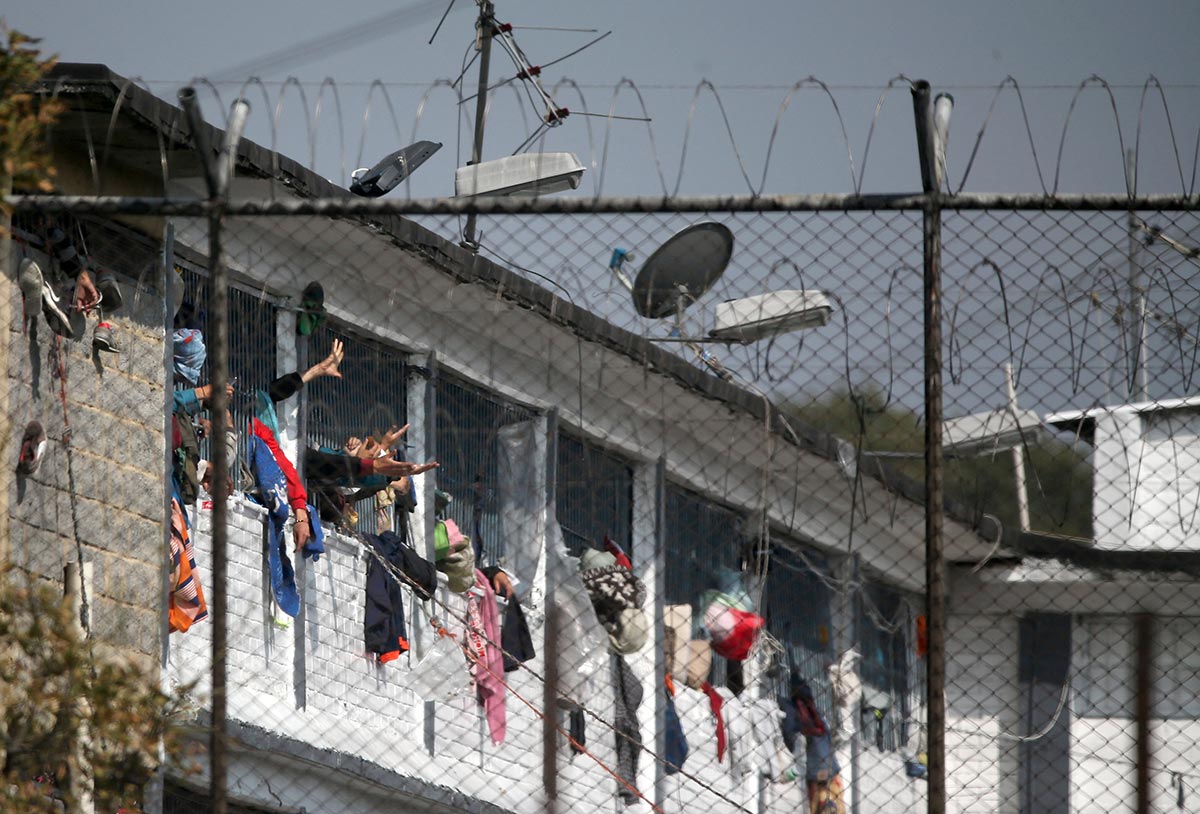
One of the million-dollar questions is what sanctions those found to be most responsible will exactly look like. Because, after three years of the JEP’s work, many details of the sanctions regime are still unknown. How is this discussion progressing?
In the JEP we are committed to sanctions being effective. From a logistical point of view, it’s a huge challenge for a justice body. Think that traditional judicial bodies, such as the Constitutional Court or the State Council, do not have the burden of thinking, designing, executing and managing sanctions. In addition, the JEP only imposes them after an in-depth dialogue between victims and perpetrators, in which they agree on which activities of redress may be appropriate and proportional to the sanctioned deeds, the most serious of all in terms of damage, perversity and reproach. This dialogue, led by the transitional judge, is unprecedented in the world.
We are seeking to create a unit within the JEP to manage, supervise and monitor sanctions. But there is something very important I want to underscore: there is a commitment by the Colombian State to create conditions for recipients of these sanctions to have security, a decent way to continue with their lives and, most importantly, to comply with restorative actions. We’re making progress in inter-institutional agreements with the Presidency’s Stabilization Council, the Mayor’s Office of Bogota and other local entities.
There is another point that is only beginning to become clear: those most responsible will receive their own sanctions, but what will happen to those whose legal situation is also defined through non-punitive measures, such as a waiver of criminal action, a suspension of the execution of the sentence or an exemption from responsibility? This is the bulk of those appearing before the Jurisdiction. Benefits granted to them are subject to a conditionality regime: to providing the truth and redress. Managing this is another element that no other jurisdiction has.
To find perpetrators working for victims in social and community projects, generating tangible solutions, would be a Keynesian moment of transitional justice.
So how does conditionality operate?
In the Jurisdiction, we also have perpetrators, participants and material perpetrators, so the challenge is perhaps even greater than when dealing only with the special sanctions [for those most responsible]. In total, some 12,500 persons are bound by conditionality regimes.
We are working to homogenize reparation mechanisms, so that an indicator of the Jurisdiction's success in the coming years can be seeing how those most responsible are already anticipating their own sanctions and are clearly inserted in reparative programs and projects for victims and communities – and that the bulk of the security forces, FARC and others [who are not most responsible] are doing the same. That is the Jurisdiction’s colossal challenge.
And this is what would make Colombia special in the international scenario. At a time of post-pandemic and economic crisis in the country, that in the 170 municipalities [prioritized because they are the poorest and most affected by war] we can find perpetrators working for victims in social and community projects, generating tangible solutions, would be a Keynesian moment of transitional justice: it would activate demand and generate economies, public goods and employment. We are going to seek that national, regional and local budgets concur in this, because it’s very important for the redress of victims, but also to heal the social fabric and fight against poverty.
There are two other issues still pending in the sanctions. For example, will former FARC commanders be able to continue in politics while they are sanctioned? When will sanctions’ time begin counting, given that so far they have not been restricted?
This is something that, as president of the Jurisdiction, I cannot answer as it would enter into the realm of the decision that the Acknowledgement Section within the [JEP’s] Peace Tribunal will adopt in due course, once the Judicial Panel for Acknowledgement submits its sanction project.
It is anyhow part of that task of the Jurisdiction that no other court in the world fulfils, because it is one thing, as a judge, to say “this person will serve a 30-year custodial sentence and will do so in this prison” and another one to come up with what we could call a restorative compound. It’s not only up to us: victims, perpetrators, the State and the judge will come together to design them.
Synchronization should allow final products and procedures from each mechanism to flow and generate cross-fertilization. This is not happening, nor can it happen, because of time constraints.
The transitional justice mechanisms in theory work together to verify that perpetrators tell the truth and redress victims. In real life, however, the JEP will last 15 years and the Truth and Reconciliation Commission (TRC) just three, ending this year. Is there a timing problem?
Indeed, in December the TRC must deliver its final report and its existence draws to an end. So there is a timing problem: synchronization should allow final products and procedures from each mechanism to flow and generate cross-fertilization. This is not happening, nor can it happen, because of time constraints.
Even so, the Jurisdiction has contributed in the terms foreseen: lists of perpetrators enjoying benefits were sent so they can provide information of a non-judicial nature. They have gone before the TRC with information and testimonies which have helped in its upcoming report and before the Unit for the Search for Persons Deemed Missing with information that may lead to recovering missing persons. This has happened, although not with the strength it could have had, given that it only captures the first years of the JEP’s work. The most important truths, the exhaustive revelations, are only now beginning to emerge - when in six months the Commission will finalise.
In any case, the explanation of the conflict’s structural causes in the TRC report will be very useful for the Jurisdiction. This historical vision of the conflict will nourish the JEP as it strives to understand macro-criminality patterns and contexts.
It’s also true that it has not been easy to coordinate victims. Rather, we have seen a kind of victim fatigue whereby they have come before the TRC, the Unit and the Jurisdiction, each with their own methodology. For example, for the TRC it’s crucial to foster absolute confidence that what is reported there will not be subject to prosecution and, therefore, it established a firewall vis-a-vis the JEP. Here I believe that the institutional architecture and coordination have not been the best, but anyhow the comprehensive [transitional justice] system approach has been useful.
What comes now will do so in a faster and more structured way. [The goal is] to simultaneously open all the remaining lines of inquiry in this second stage, which will likely begin in the second semester [of 2021].
Many victims are demanding the JEP to open cases on sexual violence, forced displacement, landmine use or even crimes against the environment. How do you envisage the second batch of macro-cases that will come in the near future?
That is an autonomous competence of the Judicial Panel for Acknowledgement and, as president of the Jurisdiction, I can only give them peripheral indications. But I would like to point out that, in record time in international and transitional criminal justice, it has been possible to advance in the first case against FARC over hostage-taking and [the second] against security forces over extrajudicial executions. These investigations allowed the justices and their teams to profoundly understand the structure, physiognomy, chain of command, flow of information, territorial organisation and policies of FARC over time. The same with security forces. This means that what comes now will do so in a faster and more structured way.
The unit [of measurement] through which the Jurisdiction has related with victims and with the country has been the macro-case. This is why we speak of macro-cases as the typical JEP dossier. However, we’re thinking more in terms of each armed actor: in FARC’s case, for example, [the goal is] to arrive at several accusations where the universe of punishable acts and crimes known to the Jurisdiction converges. In other words, to simultaneously open all the remaining lines of inquiry in this second stage, which will likely begin in the second semester [of 2021].
So will upcoming investigations take less than three years?
Exactly. Memory, historical and judicial, is very important for a transitional jurisdiction. Besides, those most responsible persons are mortal like any of us. They cannot be subject to the fact that today a child recruitment case is opened, in three years one on forced displacement and in six another on methods of warfare.
We are going to prioritise comprehensive testimonies by military structures and by those most responsible. The sum of the information available to the JEP, the cross-referencing of data banks and the teams that are working will allow us, I believe, in a reasonable time - and in a shorter time than the system envisioned - to address all the FARC cases.
Likewise, this year and next year we are going to exhaust the case on extrajudicial executions, the one regarding the [extermination of the political party] Patriotic Union will end between now and next year, and investigations will surely begin on links between paramilitary groups and the security forces. With those we really cover cases against members of the military.
So the first macro-cases were really fertilizing the ground that you will now harvest in less time?
Indeed, we’re thinking more about the structures that gave way to all this criminality. The language of macro-cases cannot disappear because it’s already in people’s consciousness and, in fact, [victim and human rights] organizations measure our work this way. But we really have to understand that armed actors have a spatiality and that there is not only displacement or sexual violence, but a number of deeds. Obviously, future lines of inquiry will surely have thematic emphases.
If government and society do not follow the lines laid down by the peace deal, the ensuing collective and historical frustration will affect not only the Jurisdiction, but the entire Colombian State.
How can you meet the expectations of all victims about which cases you open?
A transitional justice system manages a cumulus of expectations and surely it will not be able to satisfy - I say this in all sincerity - all of them.
Especially when it is a justice like ours, which not only targets those most responsible for the most serious crimes and behaviours, but also has a prospective vision of change with which government and society must concur. If both of these do not follow the lines laid down by the peace deal, the ensuing collective and historical frustration will affect not only the Jurisdiction, but the entire Colombian State.
In the JEP we want to have a greater impact on the communities most affected by the conflict. We chose to begin in Buenaventura [a port on the Western coast of Colombia], where all armed actors converged, violence still rages on and the structural aspects that could give life to 100,000 conflicts within a thousand years are present. As a comprehensive [transitional justice] system, we’re seeking the simultaneous deployment of our competences and summoning authorities to convert Buenaventura into a territory of peace because there, until now, we have all failed. Then we will tour all the most affected regions, because that is where we will hold victims’ hearings, conditionality regimes and our own sanctions, as well as rural reform and other elements [of the peace deal] that are complementary to our functions.
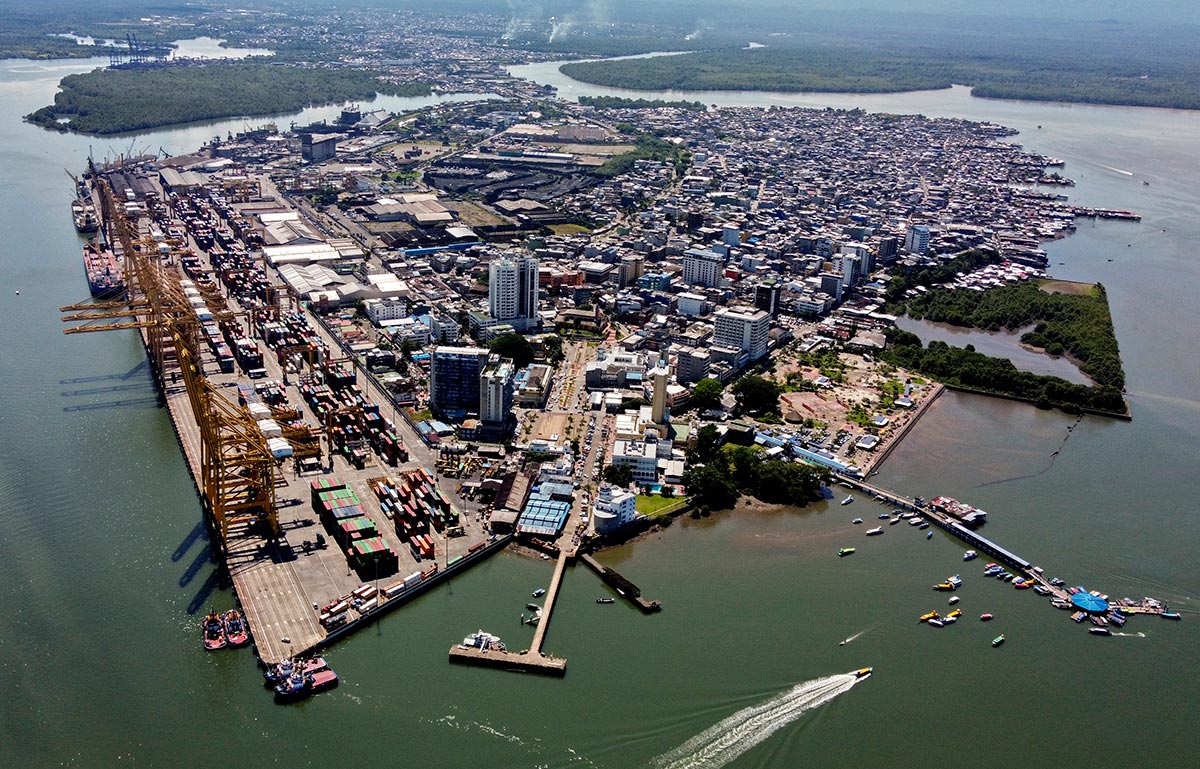
I was about to ask you about Buenaventura because we’re seeing the JEP, a jurisdiction designed to deal with the past, also addressing present problems. Isn’t this an additional burden?
The procedural rules of the Jurisdiction state that it is an obligation for justices to establish, in war crimes cases, the ex ante situation of the community and its victims, the situation when the crime takes place and finally the current or ex post situation. Why? So that measures dictated by the judge, whether in rulings or conditionality regimes, take into account these realities so that they do not happen again.
We understand non-recurrence not only as concerning the perpetrator of the crime, but also in more systemic terms.
This transitional justice depends to a great extent on what the government does to transform the conditions that explain the conflict, such as eliminating extreme poverty or the absence of statehood.
Speaking of the present, the JEP has had to work at the same time as a hostile national government, which even tried to object its procedural law. How can justice be administered in such an environment?
Our challenge is manifold. What worries me is how to fulfil it if we do not have an adequate political formula. What do I mean by this? This transitional justice depends to a great extent on what the government does to transform the conditions that explain the conflict, such as eliminating extreme poverty or the absence of statehood.
Colombia has always lived with a frontier that it has never managed to consolidate in terms of rule of law: we have a ‘far west’ in Buenaventura, in the 170 municipalities most affected by war and in other regions of the country. That’s the challenge of the 21st century for all of us.
I consider the JEP invincible, undefeatable and indispensable. To see a restorative justice acting every day is the right drug for a violent society.
The JEP has operated in the midst of a strong polarization, a pandemic, more recently a national strike and soon an election campaign. How to overcome that background noise so that Colombians can really see what is happening here?
We have a country with 9 million victims and a history of conflict that we must overcome: this is not an ideological view, but a premise of the judicial entity and the application of law in an impoverished and inequitable society. I believe that this allows us to face any opposition party or any candidate mad enough to want a return to a wartime Colombia.
I also believe we have a lot of normative strength and - forgive the expression, which I use with a certain arrogance - every reason to change things in the country. I consider the JEP invincible, undefeatable and indispensable. For new generations, this landscape of war in Colombia has to end.
Seeing those most responsible of war crimes working with their communities for eight years - a historic time of reconstruction - will be a new paradigm that generates change. If we can also apply this to the conditionality regimes of all 13.000 persons admitted in the JEP, it will be even more so. To see a restorative justice acting every day is the right drug for a violent society.
Now, if it is not a remedy, no one will be able to vaccinate this country or indemnify it from future violence. We must attempt profound changes in the 170 war-ravaged municipalities and other areas of the country: better education, public goods, economic opportunities, robust institutions, recovery of memory. Why not? It’s possible. I am hopeful that the next government will provide an adequate political environment for a transitional regime. With transitional justice and a government that complies with the peace agreement, I believe we will have another Colombia.
In all those years you have spent time with many victims. What has been the moment you were most touched by?
When I was Ombudsman, I was the first to arrive at a town of stilted houses where a massacre had taken place. Three days later, no one had arrived. The deceased were still in people’s houses. I arrived in a boat, entered a house and found an old black man, whose two dead children were in his house. He hugged me tightly and said “Thank you, you are the State”.
I felt I was letting him down, because I was not the State. He had no reason to thank me, but that was his state of prostration, humiliation and human devastation, precisely due to the total absence of the State. That massacred population has never had a State.
Was that in Nueva Venecia [a wetland village in northern Colombia]?
Yes, and they will never have a State if these transformations do not take place. This is why I permanently speak of the vacuum of statehood. That State is the debt I have with that old black man who embraced me.
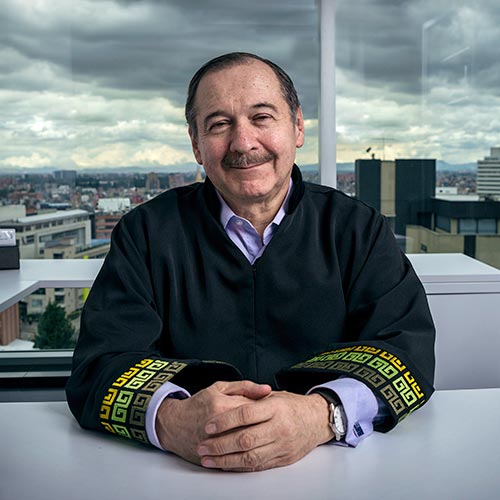
Eduardo Cifuentes Muñoz has been a justice in Colombia’s Special Jurisdiction for Peace since its creation in early 2018. A constitutional lawyer, he was one of the inaugural justices of the country’s renowned Constitutional Court created in 1991 and then national Ombudsperson, overseeing the protection of civil and human rights during one of Colombia’s bloodiest periods. He was also director of UNESCO’s human rights office and had a private law firm. He currently serves on the JEP’s appeals section and as its second president since early 2021.


